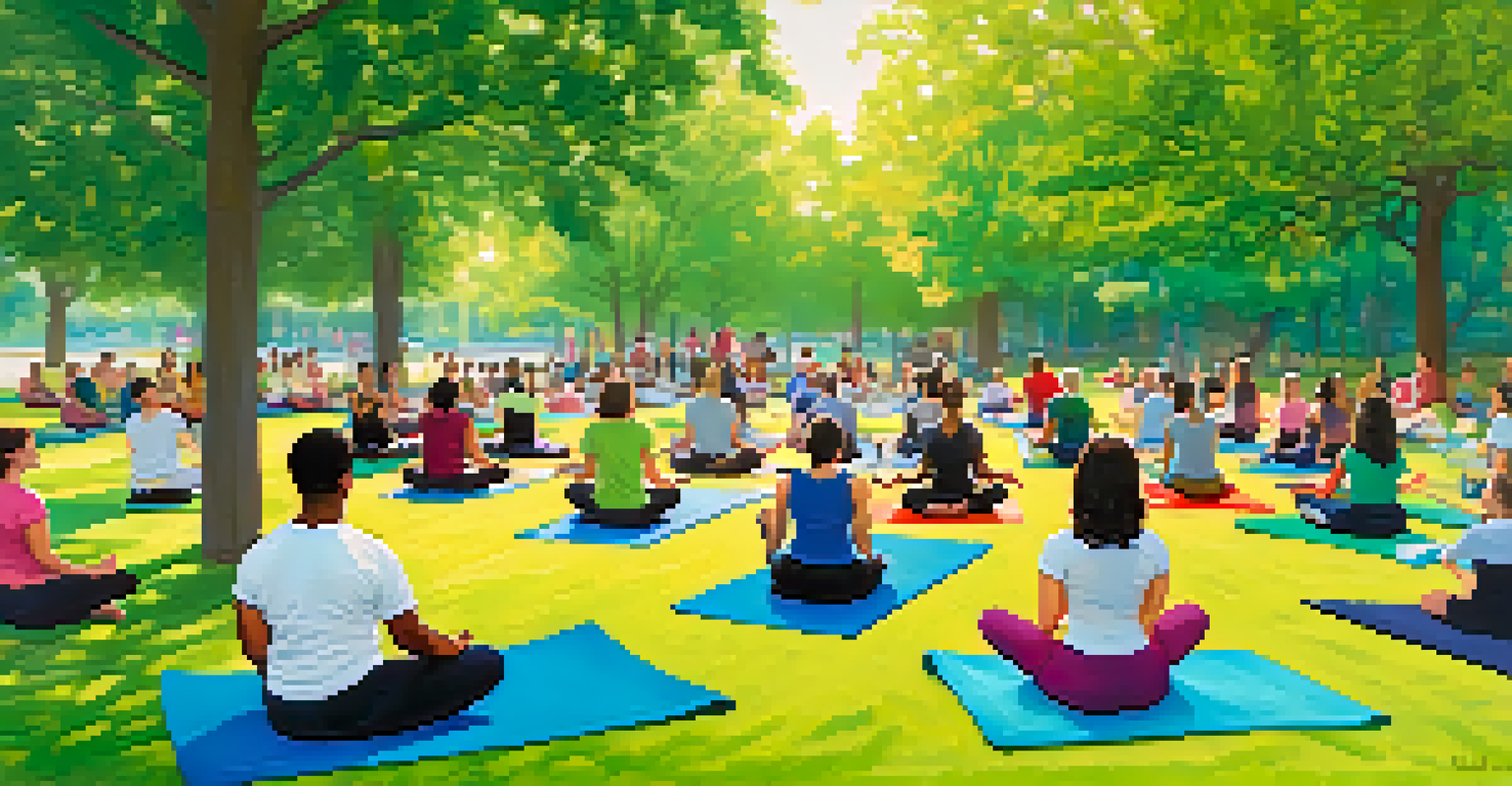Yoga Practices: Naturopathic Techniques for Stress Reduction

Understanding Stress and Its Impact on Health
Stress is a common ailment in our fast-paced lives, affecting both our mental and physical well-being. It can manifest in various ways, from anxiety and irritability to headaches and muscle tension. Understanding how stress affects your body is the first step in learning how to manage it effectively.
It's not stress that kills us, it is our reaction to it.
When we experience stress, our body goes into a 'fight or flight' mode, releasing hormones that prepare us for action. While this response can be beneficial in short bursts, chronic stress can lead to serious health issues over time. Recognizing these symptoms is crucial for taking proactive steps towards stress reduction.
Yoga, combined with naturopathic techniques, offers a holistic approach to managing stress. By incorporating mindful movement and breathing exercises, you can enhance your body's ability to cope with stressors and promote overall wellness.
The Role of Yoga in Stress Reduction
Yoga is a powerful tool for stress reduction, as it combines physical postures, breathing exercises, and meditation. This triad helps to create a sense of balance, both mentally and physically. Practicing yoga regularly can lead to improved mood and lower levels of stress hormones in the body.

For instance, simple poses like Child’s Pose or Legs-Up-the-Wall can instantly calm the mind and release tension stored in the body. By focusing on the breath during these poses, you also cultivate a deeper connection to yourself, helping to alleviate racing thoughts and anxiety.
Stress Affects Mind and Body
Understanding the impact of stress is crucial for managing both mental and physical health effectively.
Moreover, yoga encourages mindfulness, which is the practice of being present in the moment. This can be particularly beneficial when stress feels overwhelming, as it allows you to step back and view situations with greater clarity and calm.
Breathing Techniques to Alleviate Stress
Breath control, or pranayama, is an essential component of yoga that specifically targets stress reduction. Deep, intentional breathing can signal your body to relax, reducing feelings of tension and anxiety. Techniques such as diaphragmatic breathing help activate the body’s relaxation response.
The mind is everything. What you think you become.
One effective breathing exercise is the 4-7-8 method, where you inhale for four counts, hold for seven, and exhale for eight. This simple practice can slow your heart rate and promote a sense of calm, making it a great tool for stressful situations.
Incorporating these breathing techniques into your daily routine can help retrain your body’s response to stress. Over time, you'll find that you can manage stress more effectively, both on and off the yoga mat.
Meditation as a Naturopathic Technique
Meditation is a powerful naturopathic technique that complements yoga practices beautifully. It involves focusing the mind, which can help clear away the clutter of daily stressors. Just a few minutes of meditation each day can significantly improve your mental clarity and emotional well-being.
For those new to meditation, starting with guided sessions can be beneficial. Apps and online resources offer a variety of meditative practices, from mindfulness to loving-kindness, making it easier to find a style that resonates with you.
Yoga Enhances Stress Management
Incorporating yoga into your routine promotes relaxation and helps alleviate stress through mindful movement and breathing.
Regular meditation practice can lead to a greater sense of self-awareness and emotional regulation. As you become more aware of your thoughts and feelings, you can better manage your stress responses, creating a more peaceful state of mind.
Incorporating Nature into Your Practice
Spending time in nature can have profound effects on stress reduction, and combining it with yoga enhances these benefits. Practicing yoga outdoors allows you to connect with the natural world, which can be incredibly grounding. The sights, sounds, and smells of nature can soothe the mind and promote relaxation.
Consider taking your yoga practice to a local park or beach. The fresh air and natural surroundings can elevate your mood and make your practice feel more invigorating. You might also find that being in nature encourages mindfulness, as you become more attuned to your environment.
Additionally, incorporating elements of nature into your home practice, like plants or natural light, can create a calming atmosphere. This connection to nature supports a holistic approach to stress reduction, enhancing both your physical and mental health.
Creating a Stress-Reducing Routine
Establishing a consistent yoga and naturopathic routine can be incredibly effective for stress reduction. Start by setting aside time each day for your practice, even if it's just 10-15 minutes. Consistency is key, as regular practice can significantly impact your stress levels over time.
Consider blending various techniques such as yoga poses, breathing exercises, and meditation into your routine. This diversity keeps your practice engaging and allows you to address stress from multiple angles. You might even find that certain techniques resonate with you more on different days.
Community Supports Stress Relief
Joining a supportive community can enhance your yoga practice and provide encouragement in managing stress.
Remember, the goal is to create a routine that feels good to you. Listen to your body and adjust your practices as needed, ensuring that your stress-reducing routine becomes a cherished part of your day.
The Benefits of Community and Support
Joining a community or finding support in your yoga journey can enhance your stress reduction efforts. Whether through a local class or online group, practicing with others fosters a sense of connection and accountability. Sharing experiences and encouragement can make your practice more enjoyable and effective.
Moreover, participating in group classes allows you to learn from experienced instructors who can guide you in proper techniques and modifications. This knowledge can deepen your practice and help you maximize the stress-relieving benefits of yoga.

Additionally, community support can provide a safe space to discuss personal stressors and share coping strategies. Knowing that you're not alone in your journey can be incredibly comforting and motivating as you work toward better stress management.